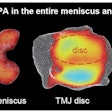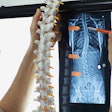
Veterans with post-traumatic stress disorder (PTSD) due to their exposure to war may experience a higher prevalence of temporomandibular disorder (TMD) signs like pain. The systematic review was published on June 10 in the Journal of Oral Rehabilitation.
The results suggest a link between war-related PTSD and TMD, the authors wrote.
“War exposure, directly or indirectly, increases the risk of developing TMJ dysfunction and TMD sign/symptoms,” wrote the authors, led by Dr. Maria Marrapodi of the University of Campania in Italy.
Those who serve in the military can experience PTSD, which can lead to feelings of anxiousness long after stressful events have occurred. PTSD may be accompanied by unbalanced neurotransmitters and possibly could be directly or indirectly linked with the incidence and course of TMD, according to the study's authors.
In addition, there has been mounting research linking psychological disturbances to a heightened risk of TMD. Though the exact nature of the correlation between psychological disorders and TMD is not understood completely, there is a solid association, according to the study.
To evaluate the incidence of the signs and symptoms of TMD among war veterans diagnosed with PTSD, researchers searched the literature, resulting in four studies dated between 2007 and 2014 being included in the review.
The studies included 596 veterans. Among these people, 274 were exposed to war, while 322 did not experience war stress. Of those who were exposed to war, 154 presented with signs and symptoms of TMD (56%). Only 65 of those who were not exposed to war (20%) experienced TMD symptoms, the authors wrote.
Overall, veterans exposed to war stress and diagnosed with PTSD had a greater prevalence of TMD symptoms like pain at muscle palpation than controls (relative risk = 2.21; 95% confidence interval, 1.13 to 4.34), indicating an association between war-related PTSD and TMD, they wrote.
Nevertheless, the review had limitations, including that different diagnostic methods were used in the studies, the authors wrote. Since war can cause physical and psychological problems that can lead to chronic diseases, those who have experienced war-related trauma should make lifestyle changes to limit their risk of developing systemic conditions and seek help from mental health professionals, they wrote.
“For those who have experienced war stress, it is important to be aware of the potential risks of TMD,” Marrapodi et al concluded.



















